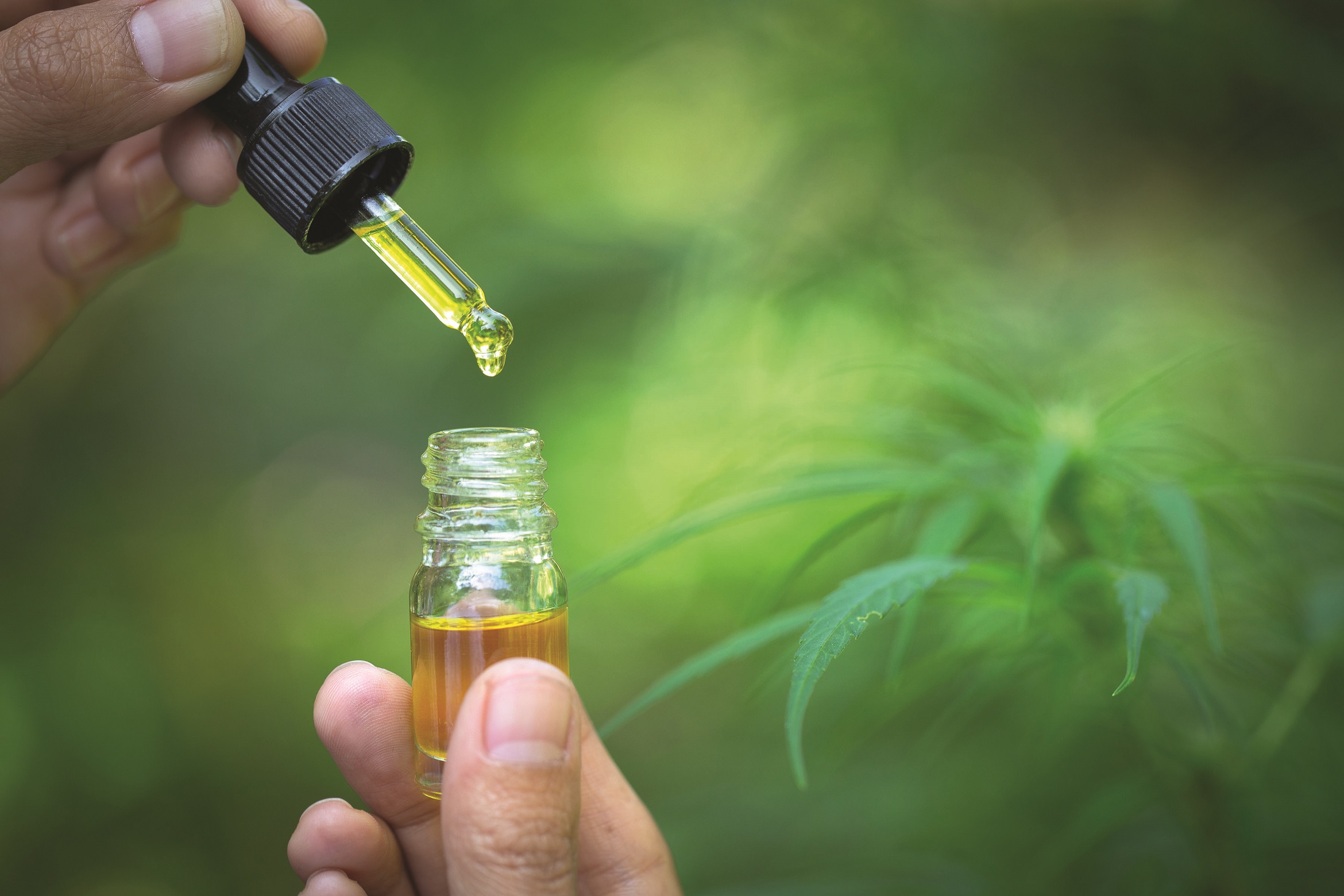Knowledge is Key to Succeeding in Cannabidiol (CBD) Category
Glenn Polyn //October 1, 2021//
By now, most members of the pet care community know the basics about cannabidiol (CBD), which is one of 120+ naturally occurring phytocannabinoids that is found in the hemp plant. CBD products from hemp can contain miniscule traces of tetrahydrocannabinol (THC), the psychoactive compound, and therefore is not mind altering and doesn’t make the subject feel high. CBD products legally cannot contain more than 0.3 percent THC.
There are three types of CBD. One type is CBD isolate, which does not contain any THC or other active compounds found in the cannabis plant. A more refined product, it is the purest form of CBD as well as being flavorless and odorless. Often used for vaping, isolate is generally cheaper than other types of CBD.
Full-spectrum CBD includes the “full spectrum” of naturally occurring cannabinoids and terpenes to create what is known as the “entourage effect.” It is not related to just one cannabinoid (isolate), but rather includes other phytocannabinoids (complex) like CBDG, CBDC, CBDV, CBDA and CBGA, natural terpenes and flavonoids, which bring an array of additional therapeutic benefits and assist in absorption and bioavailability. Terpenes and specially formulated terpene blends are believed to have important properties that include anti-inflammation, antibacterial, antifungal and pain relief.
Broad-spectrum CBD is considered a middle ground between CBD isolate and full-spectrum CBD. Broad spectrum contains all of its essential cannabinoids, such as CBD and CBG, and chemical compounds other than THC. As with full spectrum CBD, a broad-spectrum oil uses additional terpenes and flavonoids that generate the entourage effect. The benefit of broad spectrum is that, without THC content, it removes the worry of any psychoactive effects that might be caused from daily use.
Animals possess an endocannabinoid system with receptors located throughout their body. The system helps regulate components like pain, mood and sleep. Typically, internally produced stimulants can influence these receptors, but CBD works by acting on these receptors to influence them to relieve stress, improve mood and reduce pain.
Studies reveal the many proven and potential benefits to pet health. In one, Colorado State University had nine of 16 client-owned dogs with idiopathic epilepsy, a common neurological condition, take CBD oil twice daily for 12 weeks along with standard anticonvulsant drugs. In her results, published in June in the Journal of the American Veterinary Medical Association, study lead Dr. Stephanie McGrath noted that dogs in the CBD group had “a significant (median change, 33 percent) reduction in seizure frequency” while “no adverse behavioral effects were reported by owners.”
Last year, ElleVet Sciences announced that a clinical study investigating the results of its CBD+CBDA oil’s efficacy on dogs with atopic dermatitis was completed, with analysis of the data showed the majority of dogs enrolled in the study had a significant improvement in skin itchiness. The research team, led by Dr. Andrew Rosenberg of the Dermatology Center of New York, conducted a placebo blinded controlled clinical trial where dogs were either given a placebo sesame oil or ElleVet oil in the same sesame oil base. When compared, the itchiness scores by owners dropped significantly for dogs on the ElleVet oil compared to dogs on the placebo. No side effects were noted by owners.
And this year, Canopy Animal Health released the results of three studies that were published in peer-reviewed journals. The first was a study of escalating CBD dosing in dogs. The second was an escalating CBD does study in cats. The third, released on May 1, was a 28-day daily dosing study on dogs.
“While cannabinoids, particularly CBD, are of growing veterinary research interest, there is a lack of data, especially in cats,” said Dr. Justyna Kulpa, senior scientist at Canopy Animal Health, of the objective and importance of these studies. “We sought to address relevant research gaps through well-designed blinded and placebo-controlled studies. The results lend to our continued exploration of the potential therapeutic applications of CBD in companion animals.”
As more studies take place and their results are published in veterinary publications, we learn that CBD demonstrates multiple properties, including analgesic, antioxidant, anti-inflammatory, antidiabetic, antineoplastic, antiemetic and anticonvulsant. Due to its versatility and benefits, CBD can be found in many applications and forms, from oils and tinctures to topical sprays, gels and chews.
As pet CBD continues to be such a hot trend, it’s important for retailers to treat it like all other items in that quality, trusted ingredients matter. Retailers need to ensure they aren’t carrying a cheap knockoff or diluted product in order to protect their customers and the well-being of the companion animals that are using the CBD product. In addition to knowing what is in the product, knowing where it was sourced and manufactured is vitally important. In addition, the product should be backed by accepted quality and safety standards and certifications.
Members of the industry advise that retailers look for a third-party lab test (commonly called a statement of analysis or COA). This statement of ingredient purity details the results of lab testing to show the product is free of fillers, synthetic chemicals or other potentially harmful chemicals.
The removal of the compound from the hemp plant is an important step in the production of CBD, and it’s important to note that opinions vary on the best option to do so. This part of production can be performed in several ways, each with its own pros and cons. For example, natural solvent extraction, while efficient and inexpensive, affects taste and results in a lower concentration of CBD, according to the CBD Awareness Project.
One of the more popular methods is carbon dioxide (CO2) extraction, which is expensive but “has proved to be one of the most versatile and safest methods of producing cannabis concentrates,” wrote Patrick Bennett for the cannabis information resource, Leafly.
“The first of the many great features of CO2 extraction is that it is so customizable, but that’s only where the benefits begin,” wrote Chelsea Rivera, head of content for the Honest Paws website, in an April 2019 post. “Another benefit of CO2 extraction is that running supercritical liquid CO2 through the hemp plant… kills any microbial bacteria, insect mites, mold or mildew on the plant. Therefore, CO2 extraction guarantees that your concentrates will not only be cleaner, but significantly healthier for your consumption.”
Meanwhile, Treatibles uses what it calls an infusion method. According to the company’s website, it is a proprietary solventless procedure that involves medium-chain triglyceride (MCT) coconut oil, which serves as a carrier.
“The rich infusion requires no further processing, ensuring the stability of the cannabinoids and provides the greatest, most consistent levels of beneficial compounds found in all our products,” notes the company’s website. “Compared to many extraction methods, this infusion method has proven to retain nearly 100 precent of the profile of all 300+ compounds present in the hemp plant.”
What follows is a sampling of CBD brands and their views on the important aspects they feel retailers should understand about CBD in order to better educate their customers.
Animal Nutritional Products
Rob Kovler, founder of Animal Nutritional Products, notes that CBD oil may also be referred to as premium hemp oil or phytocannabinoid rich (PCR oil). From a legal standpoint, many companies have decided not to call their products CBD even though they are CBD oil A good way of telling regular hemp oil from CBD is the price, as CBD products cost five to 10 times more than hemp seed stock oil.
First and foremost, retailers must be sure to buy from a reputable company. One way to do so is to check the manufacturer’s website for a third-party analysis on its product. This certificate of analysis (COA) is a document from an accredited laboratory that shows the quantity of various cannabinoids in a product
Labeling is also very important. Without a proper supplement fact box, the product was not made in a certified cGMP lab. In addition, proper dosing guidelines are also paramount. Dosing guidelines should be detailed and displayed clearly to be easily interpreted by the consumer. Normally, dosing should go by weight, but may sometimes vary with other factors that are not on the label, including breed, age and the condition the product is being used for. For example, such issues as anxiety, seizures and cognitive function should be discussed with a veterinarian.
Austin and Kat
Transparency, testing and consistency are of the utmost important to Austin and Kat’s founder and CEO, Kat Donatello. The brand’s production process includes independent lab tests of its CBD oil before it’s used in making its broad spectrum CBD products.
“With CBD being such a new market, look for transparency and clarity of message, but there’s a learning curve to work out which companies lead with quality inputs and which cut corners with cheap, heavily processed isolate,” explained Tim Moxey, the brand’s chief operating officer. “So while test results are important, what really makes the difference is if the testing lab is legit [FDA recognized] and the results show a broad range of other minor cannabinoids.”
Aside from a label revealing the Austin and Kat logo, concentration and size, it also details suggested serving sizes, ingredients, storage information and a descriptor as well as a disclaimer. In addition, there’s a QR code on every product that allows the retailer and customer to view the test results for each individual product batch.
cbdMD
Paw CBD, the pet line by cbdMD, is a hemp-derived and veterinarian-formulated line of CBD products that feature a variety of tinctures treats and soft chews for dogs and cats. These products are made for individual pet needs with a variety of products available in varying strengths and formulas. Each product is veterinarian formulated with cbdMD’s patent-pending Superior Broad-Spectrum CBD formula sourced from non-GMO U.S.A. hemp and is third-party, ISO-certified lab tested to ensure purity and potency.
“We’ve created unique relationships with suppliers located throughout the country, helping us ensure that all of our source material only comes from high quality ingredients,” said Paw CBD brand manager Ashley Stafford. “From there, we’ve perfected our process of taking that source material and turning it into the unique formulas that make it into our products. It took years combined with a lot of research and resources to perfect this manufacturing process. And finally, we start testing. We test in house to ensure that our concentration levels are exactly precise each and every time, something not everyone does. Once we’re satisfied, we send every product batch to a third-party lab to test our products once again to ensure there are no unwanted additives or unnecessary ingredients. This helps add another layer of security so our customers can rest assured that what they’re serving their pets is the best that nature has to offer.
“It’s important that we’re honest with customers and arm them with as much information and educational tools
as possible,” she added. “We give our customers all the information they could possibly need to make the best decision that’s right for them. At the end of the day, we’re in the business of helping people and pets, and that’s most important.”
Canopy Growth
Canopy Growth feels it’s imperative that CBD products are backed by scientific studies and are developed by experts in the field of animal health. Unproven claims that a product can diagnose, treat, cure or prevent a disease should be a red flag to retailers.
“Many consumers are looking for science-backed solutions to support their pets’ mental and physical well-being, and CBD is proving to be a promising wellness supplement with tremendous potential for animals,” noted Dr. Robert Menardi, DVM, director of veterinary technical and educational services at Canopy Growth.
“Consumers need to have confidence in the quality and safety of the products they give their pets, and we’re proud to help provide it by leading the industry in cannabis and hemp clinical research, product development and testing.”
When evaluating products, Dr. Menardi explains that it’s important for any CBD pet product to be backed by science and endorsed by the industry’s leading authority on non-pharmaceutical animal health products, the National Animal Supplement Council (NASC).
“They play a critical role in providing a framework for the production of CBD products for pets, and at Canopy Growth, we follow all NASC guidelines, including requirements around independent lab testing to confirm CBD concentration and the absence of pesticides, solvents, microbes and heavy metals that can be detrimental to pet’s health,” he added. “Another critical point is to be sure that the amount of CBD in the product is appropriate. Most products on the market simply don’t include enough CBD. At Canopy Growth, we’ve formulated all of our canine products to deliver a precise and science backed amount of CBD in a highly palatable chew.”
ElleVet Sciences
ElleVet Sciences realizes that a huge segment of the pet parent population trusts and relies on their retailer for advice and guidance regarding their pet’s health. To ensure that every pet and pet parent has access to a product that works, the company launched its ellePet line of products specifically for pet retailers.
“We know retailers won’t be able to keep [ellePet] products on the shelves as they work better than anything previously available in the retail space,” said ElleVet cofounder Amanda Howland. “Veterinarians have trusted us for years, and now retailers have a product they can trust and recommend, too.”
The brand knows CBD can help with issues such as stress, joint discomfort, itching, cognitive issues and senior pet wellness, but only if the product is effective and the dosing is accurate for the issue. This is why ElleVet Sciences reminds retailers to ask the following questions to make sure they will be carrying a product that works for customers:
Efficacy: Has the actual product been tested in a clinical trial at a respected university? Are the results available? Science and data are essential.
Source of hemp: Does the company buy hemp from another source or do they grow it themselves? Do they have control over growing and extraction from seed to product? Many companies buy from the same bulk manufacturers in Colorado or Kentucky – look for phrases like “sourced from” or “grown for us.”
CBDA: Does the product contain at least 40 percent CBDA? CBDA is essential for absorption and for inflammatory issues.
Extraction: What is the manufacturer’s extraction method? Some methods, such as CO2 extraction, do not preserve the acidic forms such as CBDA and CBGA.
Dosing: Is the dosing specific for different issues? Is the dosing based on science? Dosing varies greatly depending on issue and species. Without a scientific study, the dosing is based on guesswork.
Support: Does the company provide full support to you and your customers? Being there to answer questions and having a veterinarian on staff is key to answer your questions.
Honest Paws
Honest Paws appreciates retailers who investigate products before providing advice to their customers.
“With the rise in popularity of CBD, it seems like every manufacturer is rushing to add it to their product line,” said T Alford, co-founder of Honest Paws. “Simply put, a company that spends most of their time focusing on toys, or even food, may lack the understanding of what makes a high-quality, effective CBD product. They know the term ‘CBD,’ but they may not understand the ideal terpene profiles for specific use cases or the difference in efficacy between isolates and full-spectrum CBD. Manufacturers are able to source CBD from a great number of places these days. It is absolutely critical that you know where your CBD is coming from and that the brand you are considering is consistent in their sourcing. For ideal quality, you want to consider a company that sources from the same grow fields each time and is sourcing from a USDA Certified Organic operation. This ensures not only a high quality product, but consistency.”
Alford believes that retailers should look for NASC certification and a COA when shopping for a brand to carry in their stores.
“Make sure the brand is NASC Certified – not just a member, but actually certified. This is an easy step to make sure the brand you are researching is meeting the minimum standards, and not simply trying to capitalize on the increased popularity of CBD products. And check the COAs, which should be available for every production run. If they don’t have them readily available, this should immediately raise concerns about quality control. If they do have them available, read them. I’ve seen companies selling products that the COAs clearly show are inferior to the claims on the product labeling.”
Pet Releaf
Pet Releaf controls the entire CBD production process, from seed to sale, from plant to pet. It’s important that retailers remember to share with customers that CBD is a great daily supplement that can be given year-round, as it is an impressive preventative and not just a “reactive” solution to a problem.
“The truth is that our pets are as healthy as we keep their lifestyle, and we shouldn’t wait until their health is in trouble to make a positive change,” said David Martinelli, VP of marketing at Pet Releaf. “The second important thing to remember is that while CBD is legal, it is not currently regulated. With all of the options available, you’ll need to self-identify which CBD brands and products truly are high quality and trustworthy. To do that, you can look at where and how the hemp is sourced, its ingredients, and its third party support. More specifically, you’ll want to confirm the following: One, its CBD oil is full spectrum, which means it includes all of the beneficial cannabinoids from the hemp plant including CBD to achieve the entourage effect; two, the hemp in the product is organic and free from herbicides or pesticides; three, it uses a CO2 extraction process that excretes the oil by using pressurized air at low temperatures rather than a harsher extraction method like butane, ethanol or acetone to leach the oil from the plant; four, the CBD oils aren’t mixed with ethanol or propylene glycol or contain flavoring such as peppermint – all of which are potential health hazards for your pet; five, the company provides easy access to third party testing results that ensures the quality and potency of the pet CBD products; and six, it has certifications from trusted organizations like the National Animal Supplement Council, U.S. Hemp Authority or USDA Organic.”
Purity Preferred
Purity Preferred takes pride in the fact that it owns and operates hemp farms and greenhouses in California, Colorado, Minnesota, Maryland and West Virginia. This allows the company to research new farming techniques and technologies without jeopardizing quality and reliability.
The brand is driven by the belief that, when it comes to CBD, potency is key. Purity Preferred’s benefit-focused formulations are available in a range of potencies, allowing pet owners to select a product to suit their needs based on the size of the pet. According to Kadenwood, the company supports its products with industry-leading investments, including national television and drives retailer traffic through unparalleled trade and retailer support.
Source CBD Hemp
Ian Pedersen, the founder of Source CBD Hemp, has spent nearly 10 years focusing on CBD oil benefits trough a state-licensed medical program in Arizona. At Source, Pedersen’s team has worked with thousands of animals, from dogs and cats to horses and even Bengal tigers at an Arizona wildlife sanctuary.
According to Pedersen, the best CBD oil comes from hemp, and retailers need to seek a product that is extracted naturally. He recommends CO2 extraction, which provides a refined, high quality hemp-derived CBD extract. He warns that retailers watch out for additives and preservatives. This includes flavor additives that often come from a low quality source and requires a preservative to keep them shelf-stable.
He recommends organic CBD products. Anything else could contain pesticides, heavy metals or other harmful chemicals. He also advises that retailers check the company’s certificate of analysis to ensure that its product is free of anything toxic could be dangerous for the companion animal.
Usually the fewer the ingredients, the purer the CBD. In some cases, a dark green substance means the product contains additional plant matter such as chlorophyll. The highest quality, purest extracts will have a golden color. This is a general guideline, notes Pedersen, but it’s always best to ask for third-party test results to show that the hemp and extracted CBD was grown with no pesticides or chemicals.
Santeer
Chris Denicola, CEO of Santeer, warns retailers to avoid jumping into the CBD sector without doing their homework. He advises retailers educate themselves on how and why CBD products can be of use and the differences in effectiveness and potency between the different delivery methods.
“Retailers should be aware of how the solubility of a product, or lack thereof, may be the reason consumers are returning to the store wondering why their products didn’t help their pet,” he said. “Tinctures are among the most popular CBD pet products out there, but most of that medicine doesn’t get absorbed by the body due to low solubility. Minor cannabinoids are far less soluble than CBD, so that’s something to keep in mind when looking at all of the CBG or CBN tinctures on the market.”
Dosage is a very important matter to Santeer, which works with several veterinarians to provide information to its customers. Based on date from Cornell and Colorado State University, Denicola says 2 mg/kg of dog is a recommended dose. In pounds and mg, that would be 10-20 mg of CBD for small dogs and cats, 20-60 mg for medium-sized dogs and 60 mg or more for large dogs. According to Denicola, while there’s no worry that CBD could cause a “high,” it’s worth noting that too much CBD can result in lethargy or sleepiness.
According to Santeer, tinctures are proving less effective due to low absorption rates. When it comes to pet consumption, pills and chews are superior options since they’re easy to combine with a pet’s food. Biovailability is another key consideration, as it relates to how much of the listed amount of CBD in a product is actually able to be used by the animal upon consumption. Some products may list a high amount of CBD on the label, but the actual amount that is utilized within the pet’s body ends up being far less.
Treatibles
Known for being a pioneer in creating full-spectrum CBD products for pets since 2013, Treatibles believes not all CBD oil and products are created equal. Julianna Carella, the founder and CEO of Treatibles, is a strong proponent of regulatory compliance, saying that “right questions can help break through the muck.”
“Do the CBD oil and the final products go through third party lab testing to ensure consistent cannabinoid potency and to rule out pesticides, heavy metals and bio contaminants,” she asked. “And are these results readily available on the company’s website for customers to review?”
All Treatibles products are manufactured in Safe Quality Foods (SQF) certified facilities using CGMPs (Current Good Manufacturing Practice). Its strict adherence to consistency ensures accurate dosing and product uniformity. For pet parents, this means that every serving they offer their pet contains the same amount of cannabinoid support. In addition, Treatibles is a member of the NASC, which operates under strict guidance from the FDA/CVM (Center for Veterinary Medicine).



















